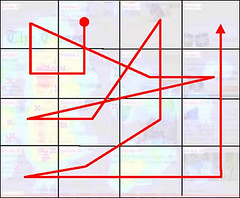HEY HEY HEY Does correlation imply causation?
 The above diagram is the product of the Eyetrack 3 project in San Francisco. It took a group of people and tracked their eye movements as they viewed webpages. The goal of the study was to identify a person's habits when viewing websites, so they can design more ergonomical sites in the future.
The above diagram is the product of the Eyetrack 3 project in San Francisco. It took a group of people and tracked their eye movements as they viewed webpages. The goal of the study was to identify a person's habits when viewing websites, so they can design more ergonomical sites in the future.Among other things, the pattern shown above was identified. This was the most common pattern the study identified in its subjects, with the first area to be viewed starting near the top left at the square, and ending in the top right, at the arrow.
When I see this pattern though, I wonder how much have we truly learned about our 'instinctual' viewing habits? I imagine what our stereotypical San Franciscan study subject might be thinking as he/she goes through this pattern:
What a coincidence! It seems to me like I could pretty easily navigate any website intuitively if I followed that pattern. It also seems to me like we're much more likely to be using a visual search program that has been determined by the way websites are designed, than that we are designing websites that conform to our visual search patterns. We're very adaptive creatures, which is one of the reasons we're still around.Here I am just to the right of upper left... seems like a good place to start as I've just typed in the url blackcoffeeblues.blogspot.com. Let's peruse the top corner here to check out the new headlines.
Well now that I know the new headlines, I'd better head to the navigation bar if I'm going to get anywhere on this site. Is this nav bar in the far right column or far left column? I can never remember, I'd better check both just in case.
Aha, here's my article! Now I'll just start at the top and work my way down, as I so often do whilst reading.
Great post, another head scratcher. I'm going to need some time to think about this one. I'll come back to this later, but for now I'll just go up to the top right corner to close this browser window.
If things do happen the way I've suggested, I don't mean to say that Eyetrack 3 was a waste of money. Empirical confirmation that indeed we do look for important information in the places that we most often find it is an important step in understanding how our decision making really works. It's also a confirmation of how malleable our minds truly are. In relatively few years, the internet has become so integrated into the lives of so many people, largely because we are so very good at adapting to our environments. Intuitively, we now know exactly where to look to quickly evaluate where the important info can be found.
There really is some good interpretation of results in the article as well. For example, because how long does a person look at a headline? Less than a second according to data collected by Eyetrack. So for me, I probably won't attract as many people by simply titling my post 'Does correlation imply causation'. Admittedly, a little dry. Most will probably get as far as "Does correla---" and have already moved on to MTV.com. But HEY HEY HEY.. now that's an attention grabber! And just to the right of top left, why that's the perfect spot!
